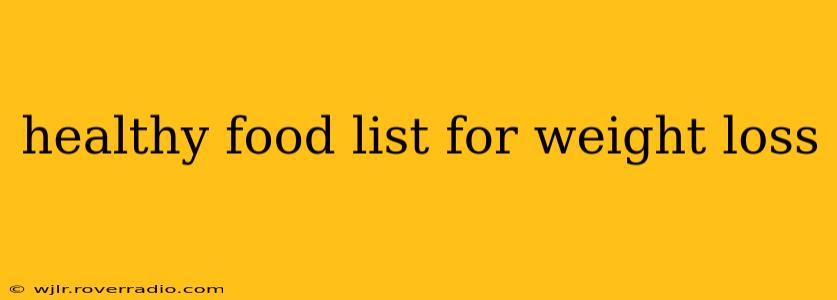Losing weight is a journey, not a race, and a crucial part of that journey involves making smart food choices. This isn't about restrictive diets; it's about nourishing your body with the right foods to support your weight loss goals and overall well-being. This comprehensive guide provides a healthy food list for weight loss, focusing on nutrient-dense options that keep you feeling full and energized.
What to Eat for Weight Loss: A Focus on Nutrient Density
The key to successful weight loss isn't just about calories; it's about choosing foods packed with nutrients. Nutrient-dense foods provide a lot of vitamins, minerals, and fiber for relatively few calories. This helps you feel satisfied with smaller portions, preventing overeating and promoting healthy weight management.
Here's a breakdown of food categories and examples to include in your diet:
Fruits:
- Berries (strawberries, blueberries, raspberries): Low in calories, high in antioxidants and fiber.
- Apples: Rich in fiber, keeping you feeling full.
- Bananas: A good source of potassium and fiber, perfect for pre- or post-workout.
- Citrus fruits (oranges, grapefruits, lemons): High in Vitamin C and antioxidants.
- Avocado: Healthy fats that contribute to satiety. (While higher in calories, the healthy fats are beneficial for weight loss when consumed in moderation.)
Vegetables:
- Leafy greens (spinach, kale, lettuce): Low in calories, high in vitamins and minerals.
- Cruciferous vegetables (broccoli, cauliflower, Brussels sprouts): High in fiber and nutrients.
- Bell peppers: A good source of Vitamin C and fiber.
- Carrots: Rich in beta-carotene and fiber.
- Sweet potatoes: A good source of vitamin A and fiber.
Lean Proteins:
- Chicken breast: A lean protein source that's easy to incorporate into many meals.
- Fish (salmon, tuna, cod): Rich in omega-3 fatty acids and protein.
- Turkey breast: Similar to chicken breast, a lean and healthy protein option.
- Beans and lentils: Excellent sources of plant-based protein and fiber.
- Greek yogurt: High in protein and can be a healthy snack or part of a meal.
Whole Grains:
- Brown rice: A good source of fiber and complex carbohydrates.
- Quinoa: A complete protein source and a good source of fiber.
- Oats: High in fiber, keeping you feeling full.
- Whole-wheat bread: Choose whole-wheat options over refined white bread.
Healthy Fats:
- Avocados: As mentioned above, healthy fats contribute to satiety.
- Nuts and seeds (almonds, walnuts, chia seeds, flax seeds): Good sources of healthy fats, protein, and fiber (consume in moderation due to calorie density).
- Olive oil: Use olive oil for cooking or as a salad dressing.
Frequently Asked Questions (FAQ)
Here are some common questions surrounding healthy eating for weight loss:
What are the best snacks for weight loss?
Healthy snacks that keep you full and prevent overeating include: a handful of almonds, Greek yogurt, fruits (apples, berries), vegetables with hummus, or a small portion of air-popped popcorn.
What are some quick and easy healthy meals for weight loss?
Quick and easy options include a simple salad with grilled chicken or fish, a lentil soup, overnight oats, or a quick stir-fry with plenty of vegetables and lean protein.
How much water should I drink for weight loss?
Staying well-hydrated is essential. Aim for at least eight glasses of water a day, more if you are physically active. Water helps you feel full, aids digestion, and supports overall bodily functions.
Can I still eat carbs while trying to lose weight?
Yes, you can and should eat carbohydrates, but focus on complex carbohydrates found in whole grains, fruits, and vegetables. These are digested more slowly, providing sustained energy and preventing blood sugar spikes. Avoid refined carbohydrates like white bread, pastries, and sugary drinks.
What are some common weight loss pitfalls to avoid?
Common pitfalls include crash dieting, skipping meals, relying on processed foods, and not getting enough sleep. Sustainable weight loss is about making long-term lifestyle changes, not quick fixes.
Conclusion: Building a Sustainable Healthy Eating Plan
This healthy food list for weight loss provides a foundation for creating a balanced and nutritious eating plan. Remember that sustainable weight loss is a marathon, not a sprint. Combine healthy eating with regular exercise and prioritize consistency over quick fixes for lasting results. Consult with a healthcare professional or registered dietitian for personalized advice tailored to your specific needs and health conditions.
